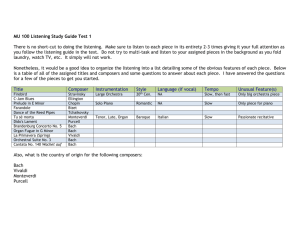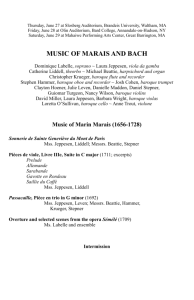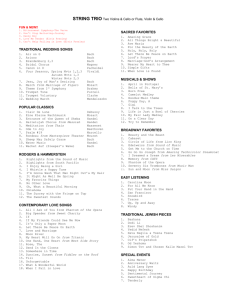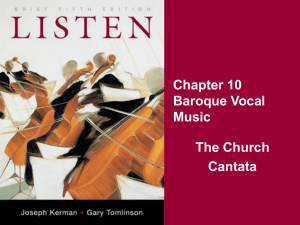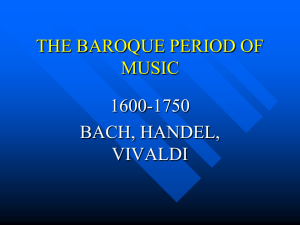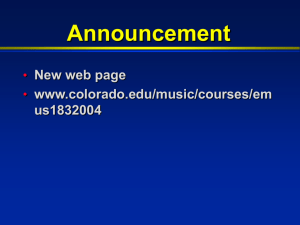Power Point For Class #3
advertisement
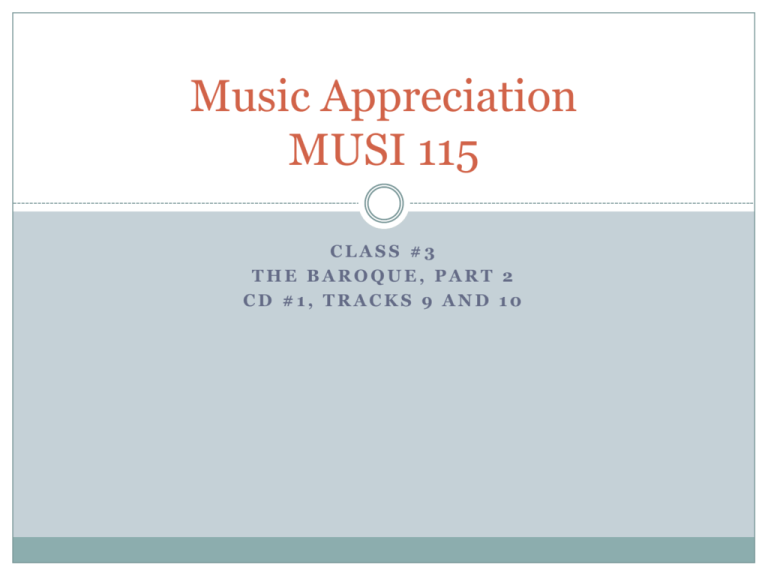
Music Appreciation MUSI 115 CLASS #3 THE BAROQUE, PART 2 CD #1, TRACKS 9 AND 10 Georg Philipp Telemann 1681-1767 Biographical facts Self-taught Perhaps the most prolific* composer of all More respected than Bach at the time Innovative composer Concerti* for unusual combinations of insturments TVW numbers Telemann-Werke-Verzeichnis* Trumpet Concerto, CD #1, Track 9 Listen for… Rhythm* is steady and predictable Virtuoso* soloists Extended breath phrases Mordents* and trills* Period Instruments -- Baroque Trumpet Limitations and Advantages Only 12 notes Difficult to play in tune Difficult to play consistently Warm, rich sound Modern Trumpet (B-flat trumpet) Limitations and Advantages Over two octave* range Precise intonation* Fairly easy to learn Harsh, thin sound Johann Sebastian Bach BAROQUE MASTER Johann Sebastian Bach, 1685-1750 Johann Sebastian Bach (1685–1750) German Composer, Organist, Educator Culminating figure of the Baroque style Career in Northern Germany Musical family Organist and composer Devout Lutheran Secular and church patrons during career Personality 20 children! Only five major appointments. Musical goals and objectives? Work ethic. JS Bach Society Web Sites http://www.jsbach.org/ http://www.baroquemusic.org/bqxjsbach.html Examples of Contrapuntal* Music Little Fugue in G minor* Mühlausen 31 years old Pietist Basic Theme The Fugue and Its Devices Fuga Contrapuntal, based on imitation Subject unifies the work Choral or instrumental Melodic lines are referred to as voices Contrapuntal* devices Inversion* Retrograde* Augmentation* Diminution* Combinations Jail! Much-desired position of Kapellmeister* in Weimar Coffeehouse crowd Subordination Well-Tempered Clavier*, Books 1&2 Intended as only instructional and experimental pieces Dedication “for the use and profit of young musicians” The Well-Tempered Clavier*, Books 1 & 2 New technique! Equal temperament = tuning Two pieces each in every new 24 Major and Minor keys 24 X 2 = 48 per book Glenn Gould Bach and the Sacred Cantata Sacred cantatas Composed for the Lutheran church Multi-movement works One unifying theme The Lutheran Chorale Battle hymns of the Reformation Early hymns: in unison Later hymns: 4-part harmony, soprano melody Unifying thread of the Protestant cantatas* Typical Work Week Monday Meeting with clergy Tuesday Composing, teaching Wednesday Church services 2-4 hours Thursday First rehearsal Friday Editing, rehearsing Saturday Final dress rehearsal Sunday 6-8 hours in church Typical Sunday Services 7 AM Motet*, hymns*, organ solo. 8 AM Cantata* and/or Chorale* 9 AM Sermon, at least one hour 10 AM – 12 Noon Cantata* and/or Chorale*, Communion* Weekday Services Daily Church 6 AM Hospitals Jails Funerals Special events Additional Duties Church Teaching 9 AM – Noon Latin, singing, composition University collegium musicum* Sacred Vocal Music Over 200 church cantatas* Four Passions* One Catholic Mass Why? Bach’s Cantatas * Typically have 5–8 movements Many movements based on chorale* tune Several choral* numbers Solos recitatives * arias * Ein Feste Burg* A mighty fortress is our God, a bulwark never failing; Our helper He, amid the flood of mortal ills prevailing: For still our ancient foe doth seek to work us woe; His craft and power are great, and, armed with cruel hate, On earth is not his equal. Martin Luther* A Mighty Fortress Is Our God* Cantata No. 80, A Mighty Fortress Is Our God, No. 8 Bach: Chorale prelude on A Mighty Fortress Is Our God* Composed 140-plus organ chorales* Organ with three keyboards and a pedal keyboard Based on chorale tune Ein feste Burg ist unser Gott Varied texture J. S. Bach and the Late Baroque Concerto* Cöthen period (1717–23) Instrumental chamber works Margrave Christian of Brandenburg* But first…. Why was Bach in Berlin? Brandenburg Concertos* 1721, BWV 1046–1051 Three movements each: I: Allegro, ritornello form, contrapuntal II: Andante, Slower, quieter, continuous imitation III: Allegro assai, four-voiced fugue Brandenburg Concerto* #1 1st Movement 2nd Movement 3rd Movement Cello Suite* #1 Yo-Yo Ma playing the Prelude (MTV-ish) Yo-Yo Ma playing the Sarabande The Goldberg Variations*, 1741, BWV 988 30 variations Harpsichord Count Kaiserling Johann Gottlieb Goldberg You know how I feel about Wikipedia, but…. Contrapuntal Master Musical Offering* (1747) 'Gentlemen, old Bach is here' The Art of Fugue * Incomplete Encyclopedia of counterpoint Methodical predictability Air On The G String* CD #1, track 10 Air* = aria* or song Played on one string only, the last (or G) string Transpositions German violinist August Wilhelmj (1845 – 1908) Almost every instrument and vocalist Julian Lloyd Webber with piano Listen for… Steady, predictable rhythm* Sustained melody* Intertwining voices between the string and keyboard BWV Numbers* Bach-Werke-Verzeichnis Bach – Works – Numbers Wolfgang Schmieder (1901-1990) Genre listing Choral Organ Other keyboard
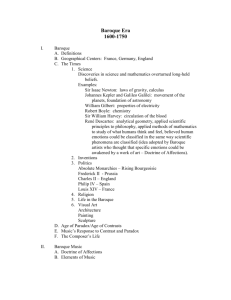
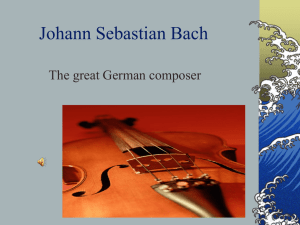
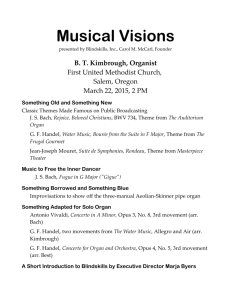
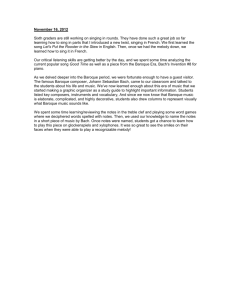
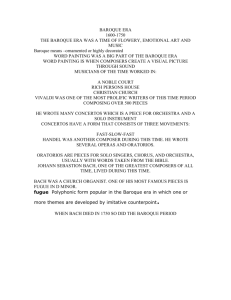
![QUESTION 6: Beatles [10]](http://s3.studylib.net/store/data/009758860_1-f81f55c5d34e2cd1e7ecfb9d98335c8f-300x300.png)
